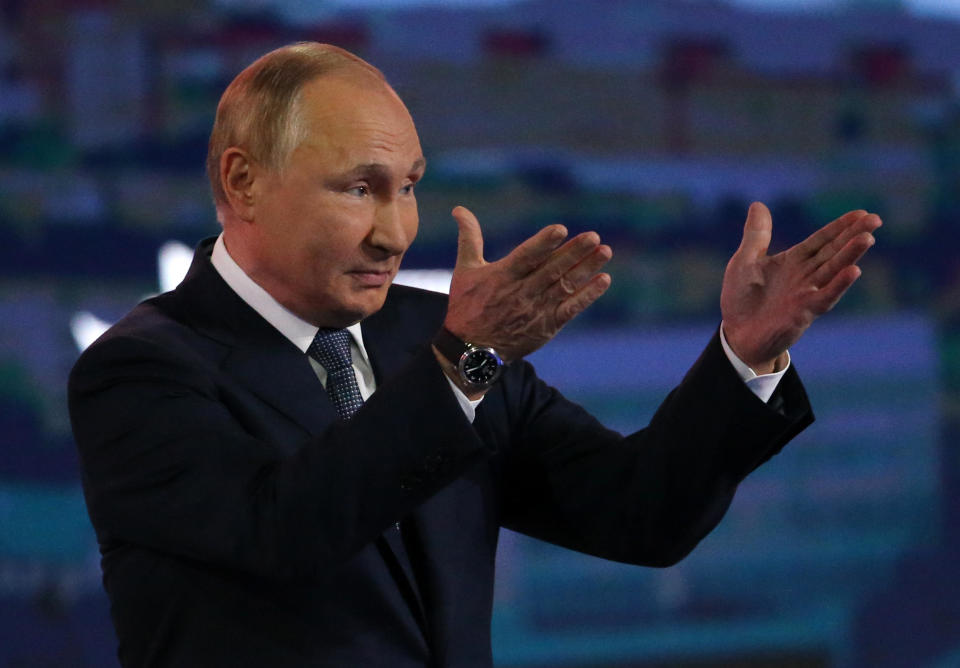Russia threatens Apple and Google with fines over Navalny team's app

Moscow — Russia's government internet censors have threatened to hit Apple and Google with fines if they don't delete an app developed by jailed opposition leader Alexey Navalny's team. The app urges Russian voters to defeat President Vladimir Putin's ruling party in the upcoming parliamentary elections.
Navalny's movement was formally labelled an "extremist" organization by Russian authorities over the summer, putting him and his supporters in the same ranks as al Qaeda and the Taliban in the eyes of Russian law. In February, Navalny was immediately arrested upon return to Russia from Germany, where he spent months recovering from a poisoning attack that he and U.S. officials accuse Putin himself of ordering.
His jailing prompted mass protests across the country, resulting in thousands of arrests.
The censor, Roskomnadzor, told Apple and Google that the "Smart Voting" app must be deleted from its app stores, citing the Navalny group behind it having been designated an extremist organization, Interfax news agency reported on Thursday.
If the companies fail to comply, Moscow "may also consider [it] as interference of the U.S. companies in Russian elections," the article stated.
As of Friday, neither platform had deleted the app.
Targeting dissent by fining big-tech
The demands are just the latest test for Western tech giants as authorities in Moscow continue to demand compliance with controversial legislation that has given the Kremlin ever-growing control over the internet, and everything on it, within Russia's borders.
Fines against Western internet companies have already piled up as many refuse to comply with new laws, including the requirement that all Russian users' data be stored domestically on Russian servers, and that service providers share decryption keys if Russia's special services ask for them, so they can scrutinize encrypted user data.
Facebook has already been slapped with nearly $600,000 in fines, followed by Google, which owes about $383,000 dollars thus far, according to a report on internet freedoms in Russia done by the advocacy group Reporters Without Borders.
The report says that in the run-up to the September parliamentary elections, from which most opposition candidates have already been disqualified, Russian authorities have significantly increased pressure on international online platforms.
Reporters Without Borders notes that the bulk of penalties against internet services for "involving minors in protest activity" targeted Western technology platforms, while other services, such as China's TikTok and Russia's version of Facebook, VKontakte, were affected to a much lesser extent.
Roskomsvoboda, an internet freedom advocacy group, said that over the past two years Russian authorities have increasingly used internet restrictions as, "a tool to combat opposition-minded information or socio-political sources" and a means of surveillance.
In July, Roskomnadzor banned over 40 websites and services associated with Navalny's movement. In March, the internet censor issued a warning to popular Virtual Private Network (VPN) services, which allow Russians to access banned content, to filter their traffic or risk being banned in the country.
An overwhelming majority of services, including NordVPN, ProtonVPN, TorGuard and others have refused, citing privacy concerns.
On Friday, as President Putin addressed a business panel in Vladivostok, with many foreign investors present via video link, the censor announced that six popular VPNs would be blocked in Russia.

Some services are equipped to bypass the bans, however, and it wasn't immediately clear how effective the restrictions would be.
Russia's internet regulators tried for two years, without much luck, to block the popular messaging app Telegram, but ended up restoring full access. The authorities have also threatened in the past to ban Twitter, but they seem to have opted to just slow down traffic on the site in what many see as a warning to platforms with far more users in the country, like Google and Facebook.
Putin has "no time" for tech
Putin has made "digitalization" one of the priorities of the Russia's economy. But the former spy also famously dislikes the internet, has no presence on social networks himself, and doesn't even own a cell phone.
During a visit to an elementary school in the city of Vladivostok on Wednesday, a boy asked Putin to sign up for his YouTube channel about ecology, leaving the president confused.
"What do I have to sign?" Putin asked. "I didn't understand — what must I sign?"
His response prompted chuckles from the kids in the audience, and the 10-year-old went on to explain that YouTube is a social media platform. (You can watch the exchange, here, on YouTube.)
"Ah, okay," Putin replied. "To your channel? Okay, I'll think about it."
The Kremlin commented on the exchange, explaining that President Putin "has no time to post on social media," and doesn't want anyone to do it for him either.
Who is Nate Burleson? Meet our new co-host of "CBS Mornings"
Heavy clashes erupt between Taliban and resistance fighters
As Delta variant spreads, Americans reconsider travel overseas

 money
money 